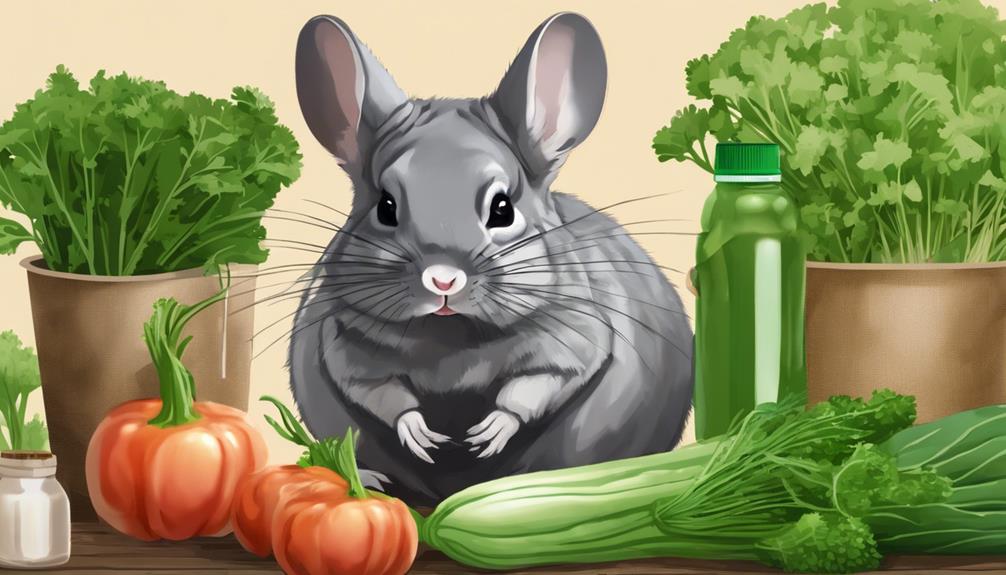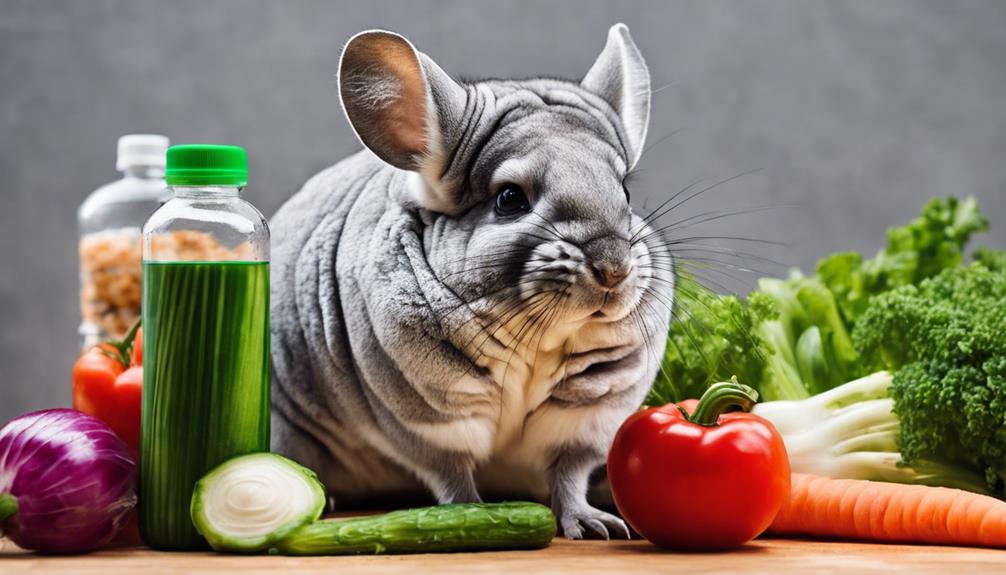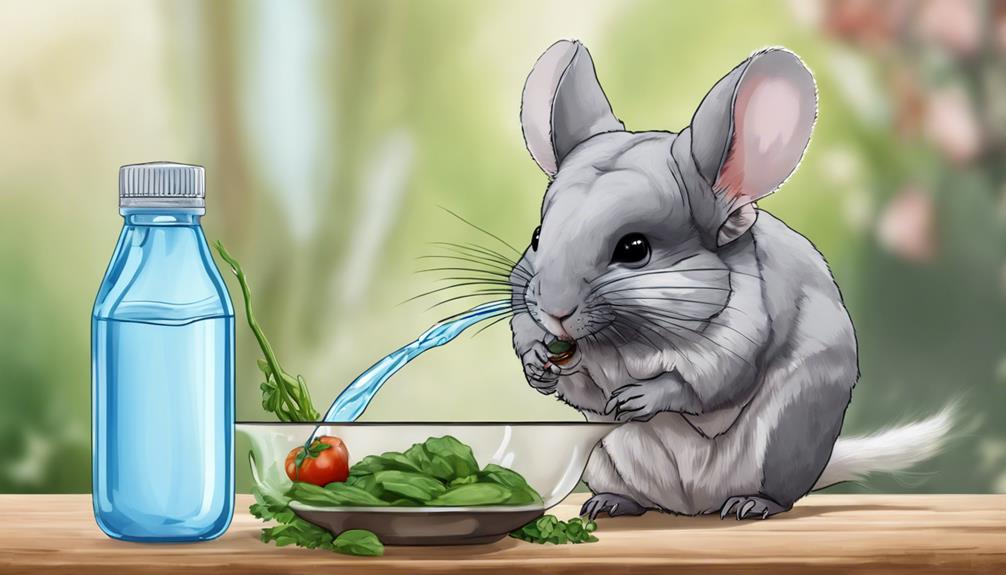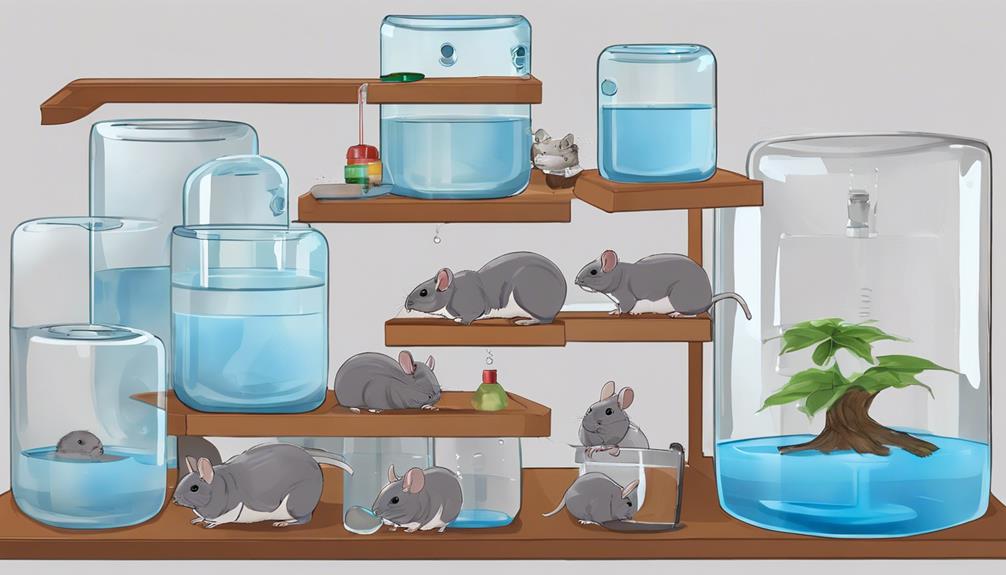Why Fresh Water Is Essential for Chinchilla Diet and How to Provide It

Fresh water is essential for the health and well-being of chinchillas. It helps regulate their body temperature, aids in digestion, and prevents dehydration. Chinchillas should have access to clean water at all times to ensure they stay healthy and hydrated.
To provide fresh water for your chinchilla, use a water bottle with a sipper tube attached to the cage. This helps prevent contamination and ensures that the water stays clean. Make sure to change the water daily and clean the water bottle regularly to prevent bacteria growth. Additionally, using filtered or bottled water can help avoid any potential contaminants in tap water that may harm your chinchilla.
Ensuring your chinchilla has a constant supply of fresh water is vital for its overall health and well-being. Hydration is key to preventing health issues and maintaining a happy and active chinchilla. Make it a priority to check their water supply regularly and provide them with clean water to support their optimal health.
Importance of Hydration for Chinchillas
Staying properly hydrated is essential for chinchillas to maintain their overall health and well-being. Hydration benefits these adorable creatures in numerous ways. Adequate water intake levels help chinchillas regulate their body temperature, aid in digestion, and support organ function. As a responsible chinchilla owner, ensuring that your furry friend has constant access to fresh, clean water is critical.
Chinchillas, like all living beings, rely on water to survive. Without enough water, they can quickly become dehydrated, leading to serious health issues. Monitoring your chinchilla's water intake levels is key to preventing dehydration. On average, chinchillas should consume around 10-30 milliliters of water per day. Factors such as diet, temperature, and activity level can affect their water needs, so it's important to observe and adjust accordingly.
Benefits of Fresh Water Consumption
Ensuring your chinchilla has access to fresh water is important for maintaining their health and vitality. Here are some benefits of fresh water consumption for your furry friend:
- Hydration benefits: Fresh water plays a significant role in keeping your chinchilla hydrated, supporting their overall well-being and bodily functions.
- Prevents dehydration: Meeting their water requirements helps prevent dehydration, which can lead to serious health issues if left unchecked.
- Aids digestion: Adequate water intake helps in the digestion process, ensuring that your chinchilla can properly break down and absorb nutrients from their food.
- Regulates body temperature: Water consumption assists in regulating your chinchilla's body temperature, especially important during hot weather or times of stress.
Risks of Dehydration in Chinchillas

You must be vigilant when it comes to monitoring signs and symptoms of dehydration in your chinchilla. Maintaining proper hydration is essential for the well-being of your pet.
Make sure you provide adequate water sources to prevent any risks of dehydration.
Dehydration Signs and Symptoms
Dehydration in chinchillas can have serious consequences if left unchecked. It's important to recognize the signs and symptoms early to prevent any harm to your furry friend. Here are some key indicators to watch out for:
- Loss of Skin Elasticity: Gently pinch your chinchilla's skin. If it takes longer than usual to return to its original position, dehydration might be a concern.
- Sunken Eyes: Check if your chinchilla's eyes appear more deeply set than usual.
- Dry Mouth and Nose: Look out for dryness in your chinchilla's mouth and nose.
- Lethargy and Weakness: If your chinchilla seems unusually tired or weak, it could be a sign of dehydration.
Stay vigilant and provide adequate fresh water to prevent dehydration in your chinchilla.
Hydration Importance in Chinchillas
Staying mindful of your chinchilla's hydration needs is important for their overall well-being and vitality. Proper hydration is key to maintaining your chinchilla's health and preventing dehydration. To guarantee your pet stays hydrated, provide fresh, clean water in a sipper bottle daily. Check the water quality regularly to avoid contamination.
Watch your chinchilla's drinking habits; a decrease may indicate a health issue. Hydration tips include placing the water bottle at a comfortable height for your chinchilla and monitoring their daily water intake. Adequate hydration brings numerous health benefits, such as aiding digestion and supporting overall wellness.
Water Sources for Chinchillas
To make sure your chinchilla remains adequately hydrated and healthy, understanding the various water sources available is important for preventing dehydration and promoting their well-being. Here are some key points to consider:
- Water Bowl Alternatives: Opt for glass or ceramic water bottles instead of plastic ones to prevent chewing and potential leaks.
- Natural Water Sources: Explore providing filtered or bottled water to avoid contaminants found in tap water.
- Consistent Water Supply: Ensure a fresh and clean water source is available at all times, changing it daily to maintain freshness.
- Monitoring Hydration: Keep an eye on your chinchilla's water intake to detect any changes in behavior that could indicate dehydration.
How Much Water Do Chinchillas Need?

Guaranteeing your chinchilla stays properly hydrated is essential for maintaining its health and well-being. Hydration levels are vital for chinchillas as they don't have a high thirst drive. These small furry creatures have low water requirements compared to other animals of similar size.
On average, a chinchilla needs about 10-15 milliliters of water per 100 grams of body weight daily. This equates to roughly 30-45 milliliters for a chinchilla weighing 300 grams. Monitoring your chinchilla's water intake is critical as inadequate hydration can lead to serious health issues. Dehydration can cause problems like bladder stones, constipation, and even organ failure.
To make sure your chinchilla is getting enough water, provide fresh water daily in a sipper bottle to prevent contamination. Remember, chinchillas are desert-dwelling animals, so they may not show obvious signs of dehydration until it becomes severe. By meeting their water requirements consistently, you can help your chinchilla thrive and stay healthy.
Providing Clean and Safe Drinking Water
For best health, it's important to maintain the cleanliness and safety of your chinchilla's drinking water supply. Ensuring the quality of the water your chinchilla drinks is vital for its well-being. Here are some essential tips to provide clean and safe drinking water for your furry friend:
- Water quality: Use filtered or purified water to eliminate harmful contaminants that could affect your chinchilla's health.
- Filtration: Invest in a quality water filtration system to remove impurities and make sure the water is safe for consumption.
- Hydration schedules: Monitor your chinchilla's water intake carefully and make sure they have access to fresh water at all times.
- Monitoring: Regularly check the water bottle or bowl for any signs of contamination or algae growth. Clean and refill it as needed to maintain freshness.
Water Dispensing Options for Chinchillas

Explore utilizing various water dispensing options to ensure your chinchilla stays hydrated and healthy. Gravity dispensers and bowls are simple and effective choices for providing water to your chinchilla. These options allow your pet to access water easily throughout the day, ensuring they've a continuous supply to meet their hydration needs. Gravity dispensers are especially convenient as they automatically refill the bowl as your chinchilla drinks, requiring less maintenance on your part.
Automatic fountains and reservoirs are another great option to explore. These devices provide a constant flow of fresh water, enticing your chinchilla to drink more frequently. The flowing water also helps prevent contamination and keeps the water oxygenated, ensuring its freshness for longer periods.
When selecting a water dispensing option for your chinchilla, explore your pet's preferences and behaviors. Observing how they interact with different systems can help you choose the best one to keep them properly hydrated. By offering a variety of water dispensing options, you can encourage your chinchilla to drink an adequate amount of water daily, promoting their overall health and well-being.
Monitoring Chinchilla's Water Intake
To guarantee your chinchilla's well-being, closely monitor their water intake by observing the placement of their water bottle. Track their daily water consumption and be vigilant for signs of dehydration.
Remember that proper hydration is essential for your chinchilla's health. Pay attention to any changes in their drinking habits or behavior.
Water Bottle Placement
Properly positioning your chinchilla's water bottle within its enclosure guarantees easy access and allows you to monitor its water intake effectively. To guarantee ideal placement, consider the following:
- Bottle height: Hang the water bottle at a height that allows your chinchilla to comfortably reach the spout without straining.
- Spout design: Choose a water bottle with a spout that dispenses water easily without leaking or causing blockages.
- Avoid direct sunlight: Place the water bottle in a shaded area to prevent water from getting too hot or developing algae.
- Secure attachment: Guarantee the water bottle is securely attached to the cage to prevent spills and keep it stable for your chinchilla's use.
Daily Water Consumption
Optimally monitor your chinchilla's water intake by observing its daily consumption to secure it stays hydrated and healthy. Keeping track of how much water your chinchilla drinks is essential.
Make sure fresh water is available at all times, and consider using water bowl alternatives like ceramic bowls to prevent spills and contamination. Establish a hydration schedule by refilling or changing the water in the bowl daily, especially during warmer months when chinchillas may drink more.
Signs of Dehydration
Stay vigilant for subtle cues that may indicate your chinchilla is experiencing dehydration, as early detection is key to ensuring your pet's well-being. To prevent dehydration and monitor hydration levels effectively, keep an eye out for the following signs:
- Decreased Water Consumption: Notice if your chinchilla is drinking less water than usual.
- Dry Skin or Fur: Check for dryness in your chinchilla's skin or fur, as this can be a sign of dehydration.
- Lethargy: Watch for increased tiredness or lack of activity in your pet.
- Sunken Eyes: Inspect your chinchilla's eyes; if they appear sunken, it could indicate dehydration.
Frequently Asked Questions
Can Chinchillas Drink Other Types of Liquids Besides Water?
You should prioritize water for chinchillas as it's essential for their hydration needs. While it may seem tempting, it's vital to avoid offering alternative beverages to make sure their liquid intake supports their health.
Are There Any Signs or Symptoms to Look Out for That Indicate a Chinchilla Is Not Getting Enough Water?
If your chinchilla isn't drinking enough water, watch for signs like dry skin, sunken eyes, or lethargy. Prevent dehydration by ensuring a fresh water supply daily and monitoring their water consumption habits closely.
Can Chinchillas Overhydrate and Is There a Risk of Water Toxicity?
You should monitor your chinchilla's water intake to maintain hydration balance. While overhydration is rare, moderation is key. Too much water can lead to water toxicity, affecting your pet's health. Be mindful of their hydration needs.
Are There Any Specific Water Additives or Supplements That Are Recommended for Chinchillas?
To guarantee peak health for your chinchilla, focus on maintaining water quality by providing fresh, clean water. Avoid additives or supplements as they can disrupt hydration balance. Stick to the basics for a happy chinchilla!
How Often Should a Chinchilla's Water Bottle Be Cleaned and Refilled?
To keep your chinchilla healthy and hydrated, clean and refill its water bottle every day. Establish a consistent hydration schedule to guarantee your pet always has access to fresh water. Proper water bottle maintenance is key.










